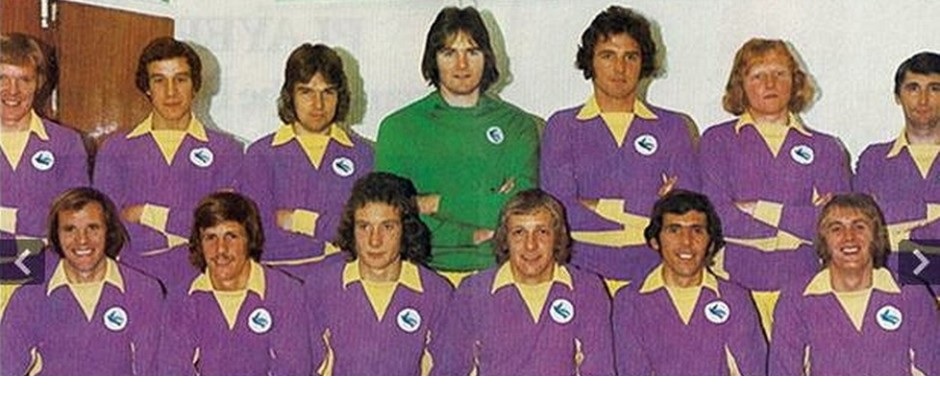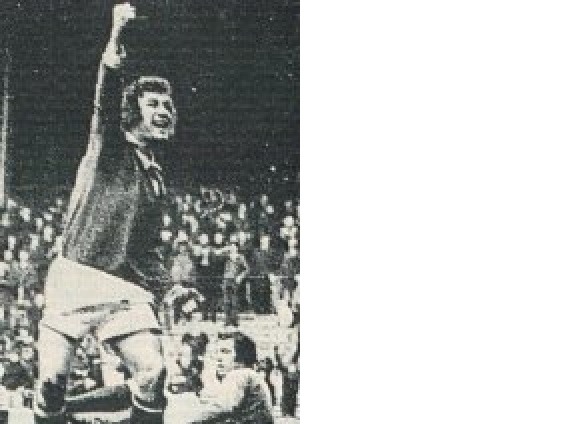
Reports started to emerge last night that following the loss of former City manager Frank Burrows last week, the man who holds the record for the most league and overall appearance records for the club had also passed away. I decided to do nothing on here about Phil “Joe” Dwyer’s passing until there had been some sort of official confirmation of the news, but, although that still hasn’t happened as I type this, it does now seem pretty certain that the news is true and someone who, perhaps more than any other, deserved the title “Mr Cardiff City” is no longer with us.
Phil was a Grangetown boy, brought up in a house on Penarth Road, the youngest, by some way, of five children. He’d go to matches at Ninian Park as a kid (often not entering through the turnstiles!) and with his prowess at football, rugby and baseball, there was always the chance he’d make his living playing sport.
Phil signed for City as a teenager and was given the nickname Joe by goalkeeper Fred Davies because of his apparent likeness to Everton and England striker Joe Royle. However, he was no centre forward, like Royle was, in those days, he was very much a defender and played at right back in the City team that were beaten by Arsenal in the FA Youth Cup Final in 1971.
Although it took Phil longer than some from that team to break into City’s first eleven, there can be no doubt whatsoever that he was the one from that side who enjoyed the best career in the senior game. Once he got into the side for his first game (a 0-0 draw at Orient on 7 October 1972 in which Alan Foggon was sent off after half an hour), Joe, as he became known by supporters, just stayed there year in year our until 1985!
Actually, that’s not strictly true, there was a serious persistent knee injury which looked set to end his time with City after about a decade in the first team which I’ll come to later, but, in essence, for nearly all of the seventies and a half of the eighties, Joe would be there every week giving his all, often with a smile and a laugh, for his hometown club.
Staying at right back for his first few seasons, Joe’s versatility began to emerge in the mid seventies. His manager at that time Jimmy Andrews probably got it right when he described Dwyer thus “brave and he had a good professional mentality. He wasn’t a great player but a good scrapper who would always give you everything he had.”.
Andrews would occasionally use Dwyer as a forward, but his influence, at club level at least, was probably greater in the midfield role he occupied during much of the 75/76 promotion from Division Three season – in his first match in the role, Joe scored twice against Wrexham in a 3-0 win and also missed a penalty which would have given him a hat trick.
The match for which Joe is remembered for most that season though is the 2-2 draw at Gillingham in November 75 when he swallowed his tongue after a collision with an opposing player and stopped breathing for a while only for physio Ron Durham to revive him using mouth to mouth resuscitation.
On the international front, Dwyer was first picked as a striker by his country, making his debut against Iran in Tehran in 1978 where he scored the only goal of the game, but the most memorable of his ten appearances for Wales both came at Ninian Park when he scored our goal in a 3-1 defeat by England and then at centreback against Scotland in the game when John Toshack’s hat trick gave us a 3-0 victory.
Increasingly Joe, was seen as a centreback by his club as his career moved into the eighties, but arthritis caused by an earlier knee cartilage operation created a situation which saw him missing games as the team were again relegated to the third tier in 81/82. Indeed, during the summer of 1982 it looked like he was leaving City as manager Len Ashurst needed convincing that Joe’s knee would stand up to the rigours of a full season (apparently, Ashurst thought Joe should retire from the game).
While recovering from another operation to his troublesome knee, Dwyer read that City would be releasing him, but working to an individual training regime, he was able to convince his manager that he was fit enough to start the first match of the 82/83 campaign and he went on to be a regular selection in another promotion team.
Dwyer showed his value to City by being an ever present in their first season back in the second tier as relegation was comfortably avoided – that was probably the height of the club’s ambitions, given the poor gates and financial problems they had to endure at the time.
84/85 proved to be Joe’s last season at the club as City struggled forlornly against a relegation that was inevitable really under the circumstances of their money problems. Having broken the record for most league appearances for the club some six months earlier, Dwyer played his last game forus on a Sunday afternoon at a sparsely populated Ninian Park as they went down 4-1 to relegation rivals Notts County on 17 March 1985.
Given that Joe had been a regular selection in the team throughout the season until then and had scored his last goal for the club only twelve days earlier in a 4-1 win at Charlton, manager Alan Durban’s decision to tell Dwyer a few days after the Notts County game that he’d agreed to let him sign for Fourth Division Rochdale looked another bizarre decision by someone who made his fair share of them during his time in charge here.
The upshot was that City’s greatest servant perhaps left with a whimper really – the fact that Joe was, apparently, earning more at Rochdale than he was at Cardiff and his record breaking earlier in the season received no recognition from the club at the time must raise questions about attitudes towards him at the club during his last days with them.
After seeing out the season with Rochdale, Joe retired from the game, going on to work in the Police Force and then as a freelance legal representative. Now, at just sixty eight years of age, Phil Dwyer has died after suffering ill health in recent years.
With the one club man becoming such a rarity these days, it could well be that Joe’s appearance records will never be broken – Cardiff City may not see his like again.
RIP

Moving on to current day football, it’s now ten wins from ten for City’s under 23 team after a 2-0 win over Colchester at Leckwith yesterday afternoon. I’d like to be able to tell you more about this match, but a doctors appointment meant that I missed the stream of the first half and, as barely anything of note happened after the break, there is not a great deal I can say except that Joel Bagan laid on the first goal for Chanka Zimba after twelve minutes and the roles were reversed between the two of them for Bagan’s goal some ten minutes later.
From what I saw, Keenan Patten did well in midfield and increasingly I’m impressed by Olly Denham at the back – George Ratcliffe was also very effective in the sweeper keeper role on the rare occasions he was tested. The win stretched our lead at the top of the table to eight points after second and third placed Bristol City and Millwall played out a 1-1 draw in London at the same time as we were playing.
Finally, the Welsh women’s team gave a good account of themselves in losing 2-0 to group leaders France in Guingamp last night. Although they could have no complaints about the outcome really, Wales may well have snatched a draw if Jess Fishlock, whose earlier volley had drawn a fine save from home keeper Peyraud-Magnin, had not seen her jabbed shot following a long throw in come back off a post just as the ninety minutes were up.
As it was, France, just like they had done in the first half scored in added time as they counter attacked swiftly for Bacha to net their second goal within seconds of Fishlock’s near thing. It was a counter attack which undid Wales for the first goal as well – Diani was left with a simple chance after a break down the right by Cascarino.
Wales’ cause was not helped by another red card for striker Kayleigh Green to add to the one she picked up in the draw in Slovenia in October. Just as on that occasion, it was for two yellow cards and, once again, she cannot really have any complaints about her dismissal.




Joe Dwyer. 100% every game. Cardiff City should now honour him in the way they failed to do in his lifetime. Those who remember and watched Joe, week in week out, those who truly love this football club don’t need me to write any more. Loyal, solid, spirited, awesome.
Goodbye Joe
Thanks Andrew and apologies for taking a while to approve your message.